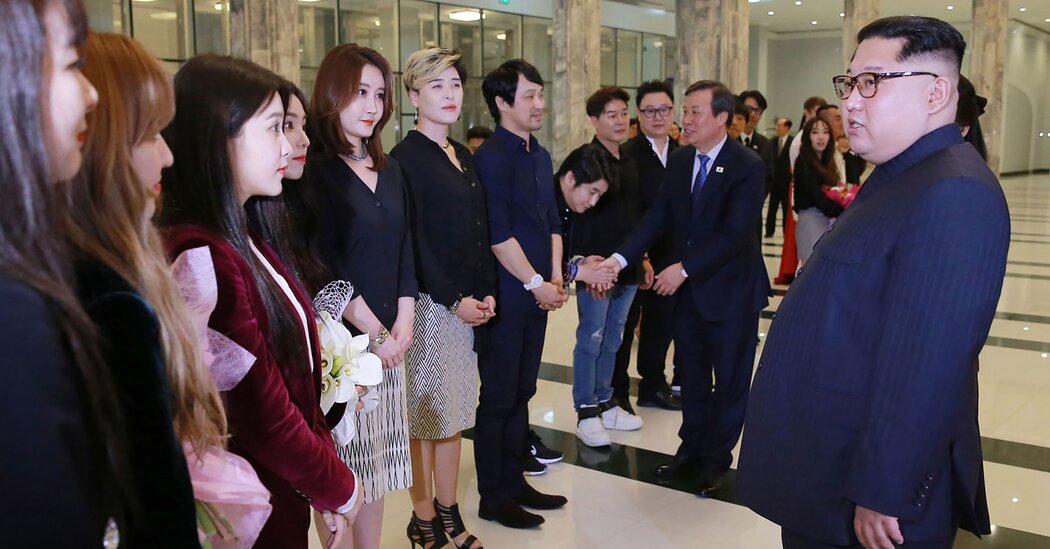
SEOUL — North Korea has publicly executed at least seven people in the past decade for watching or distributing K-pop videos from South Korea, as it cracks down on what its leader, Kim Jong-un, calls a “vicious cancer,” according to a human rights report released on Wednesday.
The group, Transitional Justice Working Group, which is based in Seoul, interviewed 683 North Korean defectors since 2015 to help map places in the North where people were killed and buried in state-sanctioned public executions. In its latest report, the group said it had documented 23 such executions under Mr. Kim’s government.
Since taking power a decade ago, Mr. Kim has attacked South Korean entertainment — songs, movies and TV dramas — which, he says, corrupts North Koreans’ minds. Under a law adopted last December, those who distribute South Korean entertainment can face the death penalty. One tactic of Mr. Kim’s clampdown has been to create an atmosphere of terror by publicly executing people found guilty of watching or circulating the banned content.
It remains impossible to find out the true scale of public executions in the isolated totalitarian state. But Transitional Justice Working Group focused on executions that have taken place since Mr. Kim ascended and on those that have occurred in Hyesan, a North Korean city and a major trading hub on the border with China.
Thousands of North Korean defectors to South Korea have lived in or have passed through Hyesan. The city of 200,000 people is the main gateway for outside information, including South Korean entertainment stored on computer memory sticks and bootlegged across the border from China. As such, Hyesan has become a focus in Mr. Kim’s efforts to stop the infiltration of K-pop.
Of the seven executions for watching or distributing South Korean videos, all but one took place in Hyesan, the report says. The six in Hyesan occurred between 2012 and 2014. Citizens were mobilized to watch the grisly scenes, where officials called the condemned social evil before they each were put to death by a total of nine shots fired by three soldiers.
“The families of those being executed were often forced to watch the execution,” the report said.
Mr. Kim rules North Korea with the help of a personality cult and a state propaganda machine that controls nearly every aspect of life in the North. All radios and television sets are set to receive government broadcasts only. People are blocked from using the global internet. But some North Koreans still manage to secretly watch South Korea’s movies and TV dramas. As the North’s economy has floundered amid the pandemic and international sanctions, defections to the South have continued.
The number of defectors arriving in South Korea has dropped sharply in recent years, however, so gathering fresh information on the North has become harder. Mr. Kim’s government has also further tightened border restrictions amid the pandemic.
But Daily NK, a Seoul-based website that gathers news from clandestine sources in the North, reported that a villager and an army officer were publicly executed this year in towns deeper inland for distributing or possessing South Korean entertainment.
And a few secretly filmed video clippings of public trials and executions have been smuggled out of North Korea. In footage shown on the South Korean TV station Channel A last year, a North Korean student was brought before a huge throng of people, including fellow students, and was condemned for possessing a USB stick that held “a movie and 75 songs from South Korea.”
Shin Eun-ha told Channel A of a public execution she and her classmates had been made to watch from the front row when she was in second grade in North Korea. “The prisoner could hardly walk and had to be dragged out,” she said, adding, “I was so terrified that I could not dare look at a soldier in uniform for six months afterward.”
Mr. Kim has at times tried to appear more flexible toward outside culture, allowing state television to play the theme song from “Rocky” and to show Mickey and Minnie Mouse characters onstage. He even invited South Korean K-pop stars to the capital, Pyongyang, in 2018, when he was engaged in summit diplomacy with President Moon Jae-in of South Korea. But at home, he has also escalated his crackdown on K-pop, especially after his talks with President Donald J. Trump collapsed in 2019 and the North’s economy has deteriorated in recent years.
Amid growing international scrutiny of North Korea’s human rights abuses, the government appears to have taken steps to prevent information about its public executions from being leaked to the outside world.
It no longer appears to execute prisoners at market places, moving the sites farther away from the border with China or town centers, and inspecting spectators more closely to prevent them from filming the executions, Transitional Justice Working Group said.
Mr. Kim has also tried to create a public image as a benevolent leader by occasionally pardoning people condemned to death, especially when the size of an assembled crowd at a public trial is large, the group said.
But K-pop seems to be an enemy that Mr. Kim cannot ignore.
North Korea repeatedly lashes out against what it describes as an invasion of “anti-socialist and nonsocialist” influences from the South. It cracks down on South Korean slang spreading among its youths, including “oppa,” which became internationally known through Psy’s “Gangnam Style” song and video.
The North’s state media has also warned that if left unchecked, K-pop’s influence would make North Korea “crumble like a damp wall.”




